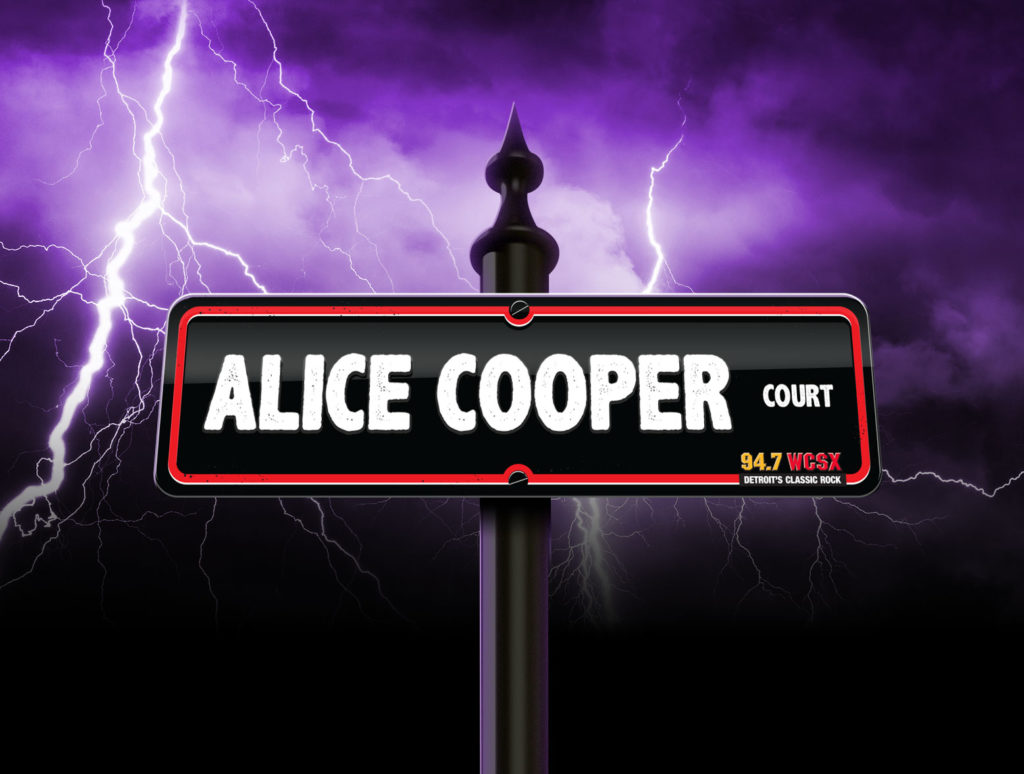
Two posts in a row about Detroit?
You’d think my music scheduling skills would have guided my ability to balance topics a bit better. But yesterday was one of those days in Detroit radio. It was gloomy, dank, rainy and it felt like Halloween arrived a month early.
Those are the perfect conditions for Alice Cooper to come back home and dedicate a new street – OK, in this case, a court – in his name – at the sight of a former insane asylum turned haunted house this All Hallows’ Eve.
(Some cities are famous for their museums. Others for their waterfronts. In Detroit, it’s mental institutions.)
And once again, it was Detroit’s Classic Rock station, WCSX, that paved the way, along with its morning guy, Jim O’Brien, who’s making these events a tradition.
I could tell you about this radio station’s stellar ratings all day. But that’s not the story. There are stations with big shares and monster cumes in every market of the country. And as we know, that success is often fleeting.
This is about building a brand that’s built to last in a city that still values its radio. I often preach the benefits of live and local in this blog – capturing that local vibe, heritage, and fabric of a community. I’m the consummate of fan of talent acting as ambassadors to cement a radio station’s linkage to its community and its audience.
But it seems like every time I write a post about how local radio is the only medium that can make this happen, it is met with skepticism and downright negativity by those who can only be described as self-hating former radio pros. And I get it. If you worked in this business in the ’70s or ’80s, you might have been fortunate enough to spend some memorable years at stations that truly lived up to this potential. For the most part, that radio industry is a thing of the past.
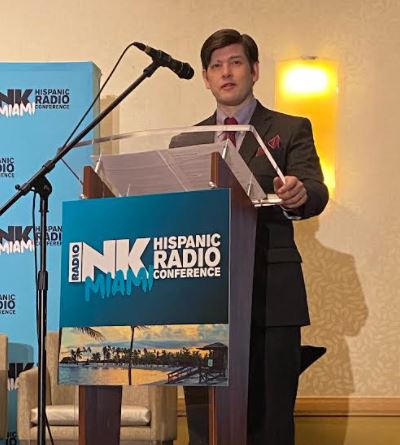
Here we are in the 21st century, and even an FCC Commissioner is lamenting the unfair competitive environment broadcasters face, going head-to-head with unregulated behemoths like Facebook, Google, YouTube and Amazon. Nathan Simington made that comparison yesterday at Radio Ink’s Hispanic Conference in Miami. And he led off his diatribe, citing Apple and its App Store, making the rules about who gets in, who is barred, and how those multi-billion dollar profits are divvied up.
Alas, Commissioner Simington offered no simple answer to this existential media imbalance. He did open the door to less restrictive broadcast rules, noting “The Commission can reduce burdens to broadcasters and offer greater freedom to operate.”
Translation: More deregulation.
But as we all learned after the Telecommunication Act of 1996, the law that ushered in the current state of radio’s version of “Risk,” owning most or even all the stations in Topeka isn’t going to solve radio’s biggest, systemic problems. And we can all wait for the Commission to act until we’re all qualified for Medicare.
Or we can take control of our destinies, and do the smart, tactical thing by leaning into the attributes that only radio has – its sense of place and community.
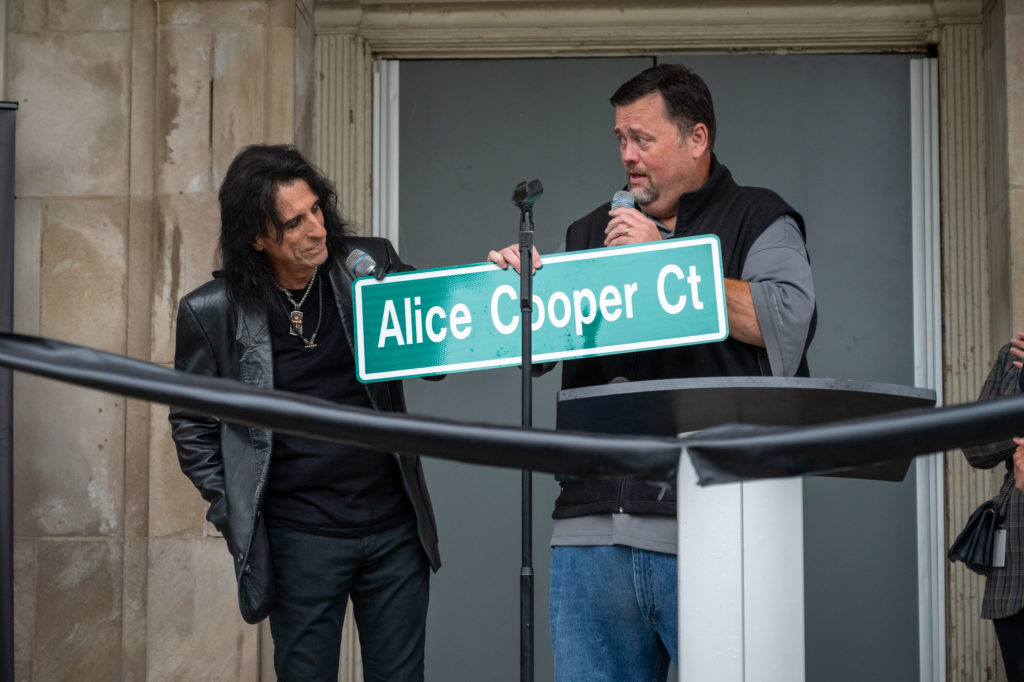
That’s a big reason why CSX and O’Brien are so noteworthy. A street named for a hometown music hero didn’t just come and go during yesterday’s dedication ceremony at Eloise.
It’s becoming a tradition for this station to honor a part of its community that is as famous as Detroit’s connection to cars:
Music, of course.
And as Jim O’Brien told me, “I was thinking back to Glenn Frey Drive. I remember asking ‘Why do we wait until someone’s gone to show appreciation to them?’ That’s why Alice Cooper Court is so special. To have him with us when we unveiled it yesterday was powerful. It’s our way of saying thank you to Alice for being part of our lives.”
Whether it’s soul, rock n’ roll, hip-hop, jazz, punk, or EDM, no metro in this country – or this planet – has produced so many seminal stars. Many only need one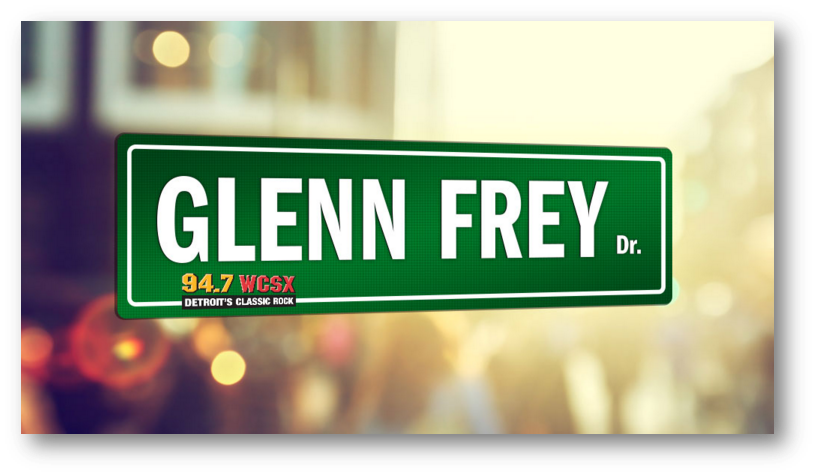 name: Madonna, Aretha, Motown, Eminem.
name: Madonna, Aretha, Motown, Eminem.
When it comes to promotions, we all want to be a part of something big. And there’s no doubt fewer stations are able to pull off a market-wide, memorable event in 2021.
Even those big concerts, festivals, and fireworks shows are transient: they come, they make a big splash, and they’re gone.
That’s why WCSX’s efforts to create a sense of permanence for local musicians is impressive. Those memories are lasting. When locals drive by one of these streets, the association with the radio station that made it happen is in place.
As WCSX’s Director of Programming, Scott Jameson, puts it, “The strongest tool in the box for terrestrial radio is being insanely local. Competitors may replicate your music recipe, but that’s only half the battle. Artist ownership, connecting with your community and delivering what your P1’s are passionate about drives brand loyalty.”
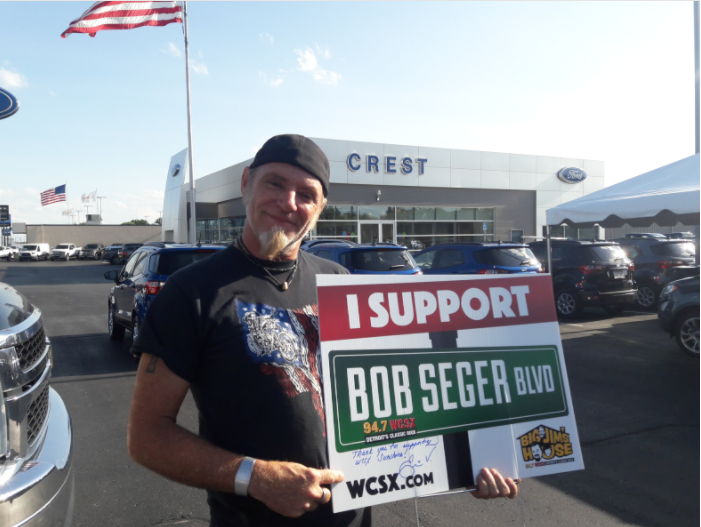 Bob Seger was a recipient of Detroit’s version of a Hollywood star when his boulevard was dedicated in Allen Park in 2018 (Ann Arbor, where Bob grew up said “No”).
Bob Seger was a recipient of Detroit’s version of a Hollywood star when his boulevard was dedicated in Allen Park in 2018 (Ann Arbor, where Bob grew up said “No”).
And before that, it was the Eagles’ Glenn Frey‘s passing in 2016 that motivated O’Brien and CSX to lobby the powers-that-be in Royal Oak to change the name of the street in front of his alma mater, Dondero High School, to Glenn Frey Drive.
Even Alice Cooper remarked about this WCSX tradition of naming streets in honor of some of its biggest musical stars:
“I love the idea that they’re naming streets after rock stars in Detroit.”
What’s not to love?
Much credit to Scott Jameson, Mac Edwards, the station staff, and parent company Beasley Media Group for encouraging this embrace of the local ethos. There are really just a few markets where these promotions actually take on a tribal feel.
And Detroit is one of them. It’s one thing to “get” what makes a town and its listeners tick.
It’s another – as Lee Abrams reminds us – to AFDI.
Come to think of it, Lee was one of WRIF’s program directors, way back in the early ’70s.
It figures.
Hey, Jim, could Suzi Quatro Street be next?
Thumbnail photo credit: Jenny Risher
Fox 2 Detroit coverage of the Alice Cooper Court dedication is here.
- Media And Technology In 2025: Believe It Or Not! - April 18, 2025
- In Radio, You Just Never Know - April 17, 2025
- The Secret To Making A Great Podcast (And Great Radio) - April 16, 2025




This is not only a fabulous tradition, but an excellent article that should encourage all of us to focus on our markets unique attributes. Well done Beasley and Scott Jameson. Great blog, Fred.
Appreciated, Mike.
After serving as the KLEM Radio Sports Director for 48 years in Le Mars, Iowa, the Le Mars City Council this year renamed the street next to the football stadium “Callahan Drive,” after retiring Denny Callahan.
A great honor, to be sure, Dave. Thanks for the comment.
This is a fabulous idea, that is until someone unearths some miss-deed the artist performed in kindergarten or junior high that doesn’t align with the current ‘acceptable’ norms of the latest bunch of morality inquisitors. The villagers will cart out the torches and ropes and bring the street signs down in a blaze of indignant righteousness.
Misdeeds from a rock star? Not a chance.
Ha! Well, that is one advantage to living outrageous lifestyles of excess front and center for all the world to see! Someone complains and you’re like, “Man, have you ever even HEARD any of our music??”
Fred,
I love to see this kind of local passion for the community. We talk local all the time, it doesn’t get more local than this. It may not be main street but it is Alice Cooper Court, in the Motor City! Another reason why ‘CSX cleans up in the ratings.
In Canada, there is no larger homegrown rock act like The Tragically Hip. In 2009, I was fortunate enough to be a part of a rock station in the Hip’s hometown of Kingston, Ontario. Our station was successful in acquiring the naming rights to the local multi purpose facility, hockey rink, The K-Rock Centre. It’s one way to own all the shows in your market.
After a multitude of debate with local politicians we managed to have the street re named where the K-Rock Centre resided to The Tragically Hip Way.
Stationality localized, The K-Rock Centre @ 1 Tragically Hip Way
Love it, Doug. As you point out, it starts with hometown passion. And then the hard work and persistence kick in.
Suzi Quatro Street🙌🏽! Yes, please.
AKA Leather Tuscadero!
Naming streets after local Rock icons is simple, effective and demonstrates it doesn’t have to cost a lot of money to make a significant impact in your market. Thanks for sharing.
Appreciate the comment, Ken. It’s something many stations could pull off, but it takes time, work, and perseverance.